-
 Bitcoin
Bitcoin $108,262.4325
-1.40% -
 Ethereum
Ethereum $2,518.2882
-2.94% -
 Tether USDt
Tether USDt $1.0003
-0.01% -
 XRP
XRP $2.2262
-1.71% -
 BNB
BNB $653.9254
-1.55% -
 Solana
Solana $148.1036
-3.11% -
 USDC
USDC $1.0000
0.01% -
 TRON
TRON $0.2829
-1.45% -
 Dogecoin
Dogecoin $0.1639
-4.82% -
 Cardano
Cardano $0.5742
-4.43% -
 Hyperliquid
Hyperliquid $38.9506
-3.95% -
 Sui
Sui $2.9040
-4.34% -
 Bitcoin Cash
Bitcoin Cash $484.8307
-2.62% -
 Chainlink
Chainlink $13.1971
-3.73% -
 UNUS SED LEO
UNUS SED LEO $9.0822
0.51% -
 Avalanche
Avalanche $17.8613
-4.01% -
 Stellar
Stellar $0.2385
-2.26% -
 Toncoin
Toncoin $2.7570
-3.88% -
 Shiba Inu
Shiba Inu $0.0...01145
-3.99% -
 Litecoin
Litecoin $86.9999
-2.43% -
 Hedera
Hedera $0.1538
-3.90% -
 Monero
Monero $313.7554
-2.03% -
 Polkadot
Polkadot $3.3681
-5.08% -
 Dai
Dai $1.0000
0.00% -
 Ethena USDe
Ethena USDe $1.0001
-0.01% -
 Bitget Token
Bitget Token $4.4401
-2.97% -
 Uniswap
Uniswap $6.9644
-8.41% -
 Pepe
Pepe $0.0...09666
-4.79% -
 Aave
Aave $266.5686
-5.04% -
 Pi
Pi $0.4713
-4.95%
Will USDT be hacked?
USDT, while not directly hacked, faces security risks through exchanges and smart contract vulnerabilities; Tether implements audits and multi-signature wallets for protection.
Apr 09, 2025 at 07:00 pm
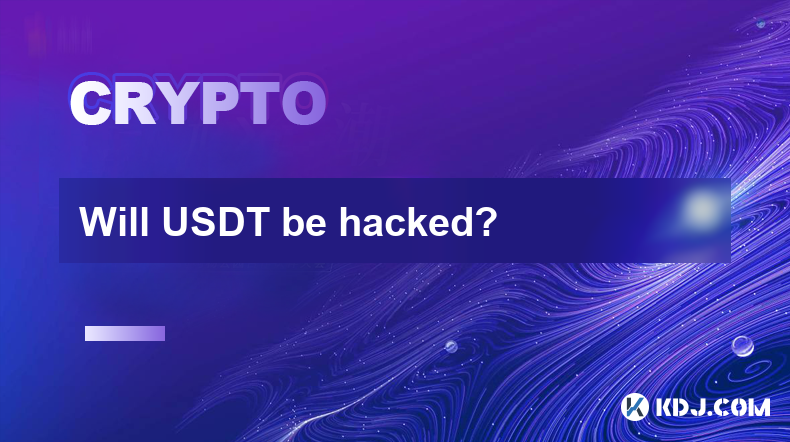
The question of whether USDT, the popular stablecoin, can be hacked is a significant concern for many in the cryptocurrency community. USDT, also known as Tether, is designed to maintain a stable value by being pegged to the US dollar. However, like any digital asset, it is not immune to potential security threats. This article will explore the various aspects of USDT's security, including its underlying technology, past incidents, and the measures in place to protect it from hacks.
Understanding USDT's Technology
USDT operates on multiple blockchains, including Bitcoin's Omni Layer, Ethereum, and Tron. Each of these platforms has its own set of security protocols and potential vulnerabilities. The Omni Layer, for instance, uses the Bitcoin blockchain, which is known for its robust security due to its decentralized nature and high hash rate. Ethereum and Tron, on the other hand, use smart contracts, which can be more susceptible to hacks if not properly audited.
- Bitcoin's Omni Layer: Utilizes the security of the Bitcoin network, making it highly resistant to 51% attacks.
- Ethereum: Employs smart contracts, which require thorough auditing to prevent vulnerabilities.
- Tron: Also uses smart contracts, with a focus on high transaction throughput but similar security concerns as Ethereum.
Past Incidents and Security Breaches
While USDT itself has not been directly hacked, there have been incidents involving exchanges and wallets that hold USDT. For example, in 2017, the Bitfinex exchange, which is closely associated with Tether, was hacked, resulting in the theft of millions of dollars worth of cryptocurrencies, including USDT. This incident highlighted the importance of securing the platforms that handle USDT rather than the stablecoin itself.
- Bitfinex Hack (2017): Hackers stole around 120,000 BTC, which indirectly affected USDT holders.
- Other Exchange Hacks: Various exchanges have been compromised, leading to the loss of USDT held on those platforms.
Measures to Protect USDT
Tether Limited, the company behind USDT, has implemented several measures to enhance the security of the stablecoin. These include regular audits, collaboration with security firms, and the use of multi-signature wallets. Additionally, Tether has a reserve system that is supposed to back each USDT with an equivalent amount of USD, which adds another layer of security.
- Regular Audits: Tether undergoes periodic audits to ensure the integrity of its reserves.
- Security Partnerships: Collaborations with cybersecurity firms to identify and mitigate potential threats.
- Multi-signature Wallets: Requiring multiple signatures for transactions to prevent unauthorized access.
Potential Vulnerabilities
Despite these measures, there are still potential vulnerabilities that could be exploited. Smart contract bugs, for instance, have been a common point of failure in the cryptocurrency space. If a vulnerability is found in the smart contracts used by USDT on Ethereum or Tron, it could potentially be exploited to manipulate the stablecoin's supply or value.
- Smart Contract Bugs: Errors in the code that could be exploited by hackers.
- Phishing Attacks: Scammers tricking users into revealing their private keys or other sensitive information.
- 51% Attacks: Although less likely on major blockchains, a successful attack could disrupt the network's operations.
The Role of User Responsibility
While Tether and the platforms that support USDT have a significant role in ensuring security, users also have a responsibility to protect their assets. This includes using secure wallets, enabling two-factor authentication, and being cautious of phishing attempts. Educating users about these best practices can help reduce the risk of hacks.
- Secure Wallets: Using hardware wallets or reputable software wallets to store USDT.
- Two-Factor Authentication: Adding an extra layer of security to prevent unauthorized access.
- Phishing Awareness: Being vigilant against emails or websites that attempt to steal personal information.
The Future of USDT Security
As the cryptocurrency space continues to evolve, so too will the security measures surrounding USDT. Tether Limited is likely to continue investing in security technologies and practices to protect its users. Additionally, advancements in blockchain technology, such as the development of more secure smart contract platforms, could further enhance the safety of USDT.
- Ongoing Security Investments: Tether's commitment to improving its security infrastructure.
- Blockchain Advancements: New technologies that could make smart contracts and other blockchain components more secure.
- Regulatory Compliance: Adhering to regulations that may impose additional security requirements.
Common Questions Related to USDT and Hacks
Q: Has USDT ever been directly hacked?
A: No, USDT itself has not been directly hacked. However, exchanges and wallets holding USDT have been compromised in the past, leading to the loss of the stablecoin.
Q: What can users do to protect their USDT from hacks?
A: Users can protect their USDT by using secure wallets, enabling two-factor authentication, and being cautious of phishing attempts. Educating oneself about security best practices is crucial.
Q: What measures does Tether Limited take to secure USDT?
A: Tether Limited employs regular audits, collaborates with security firms, and uses multi-signature wallets to enhance the security of USDT. They also maintain a reserve system to back each USDT with an equivalent amount of USD.
Q: Are there any potential vulnerabilities in USDT's technology?
A: Yes, potential vulnerabilities include smart contract bugs, phishing attacks, and, although less likely, 51% attacks on the blockchains that support USDT.
Q: How might future advancements in blockchain technology affect USDT's security?
A: Future advancements could lead to more secure smart contract platforms and other blockchain technologies, potentially enhancing the safety of USDT. Tether Limited's ongoing investment in security will also play a role in improving USDT's security.
Disclaimer:info@kdj.com
The information provided is not trading advice. kdj.com does not assume any responsibility for any investments made based on the information provided in this article. Cryptocurrencies are highly volatile and it is highly recommended that you invest with caution after thorough research!
If you believe that the content used on this website infringes your copyright, please contact us immediately (info@kdj.com) and we will delete it promptly.
- Bitcoin's Pattern Break: Are HODLers the Key to the Next Surge?
- 2025-07-04 18:50:12
- Bitcoin Price, Trump's Bill, and the $150K Dream: A NYC Take
- 2025-07-04 19:50:12
- Ethereum, LILPEPE, and the July Bounce: Will Pepe Steal ETH's Thunder?
- 2025-07-04 19:10:12
- Binance Institutional Loans: Unlocking 4x Leverage and Zero Interest for Whales
- 2025-07-04 19:15:12
- Bitcoin Bull Run: Analysts Eye Peak in Late 2025?
- 2025-07-04 19:20:13
- Pepe Indicators, Bullish Forecast: Can the Meme Coin Rally?
- 2025-07-04 19:25:12
Related knowledge
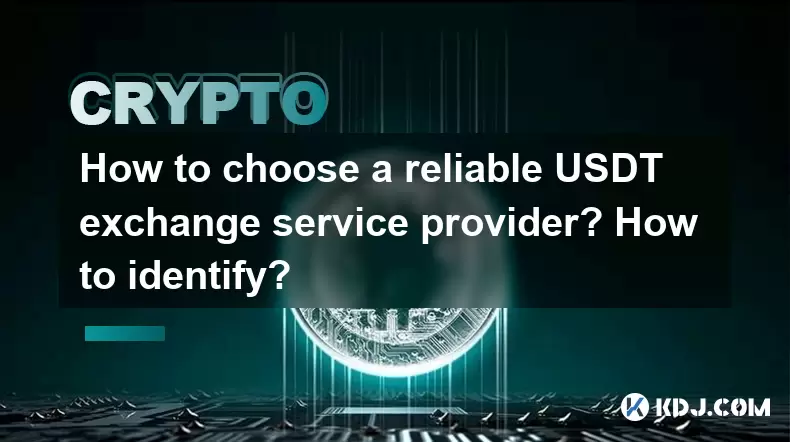
How to choose a reliable USDT exchange service provider? How to identify?
Jun 12,2025 at 03:15pm
Understanding the Role of USDT in Cryptocurrency TradingUSDT (Tether) is one of the most widely used stablecoins in the cryptocurrency market. It is designed to maintain a 1:1 peg with the U.S. dollar, offering traders and investors a way to hedge against volatility while remaining within the crypto ecosystem. Choosing a reliable USDT exchange service p...
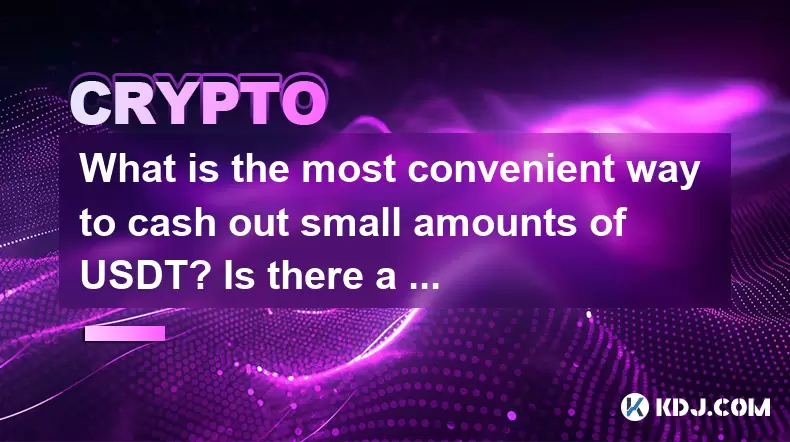
What is the most convenient way to cash out small amounts of USDT? Is there a shortcut?
Jun 11,2025 at 11:00pm
Understanding the Need to Cash Out Small USDT AmountsCashing out small amounts of USDT can be a challenge for many crypto users. Traditional methods often involve high fees, minimum withdrawal limits, or cumbersome verification processes that make it inefficient for small transactions. The key is to find a method that balances speed, cost, and convenien...
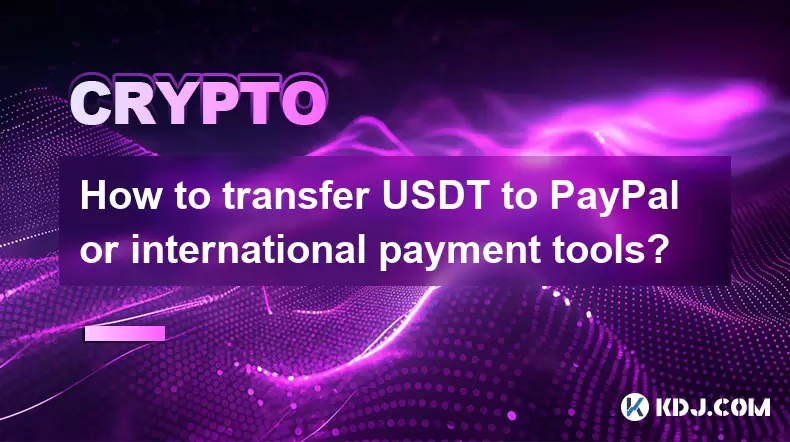
How to transfer USDT to PayPal or international payment tools?
Jun 15,2025 at 05:28am
Understanding the Basics of USDT and PayPal IntegrationUSDT (Tether) is a stablecoin pegged to the US dollar, offering blockchain-based value transfer with minimal volatility. PayPal, on the other hand, is a centralized digital wallet that facilitates fiat currency transactions globally. Direct integration between USDT and PayPal does not exist due to t...
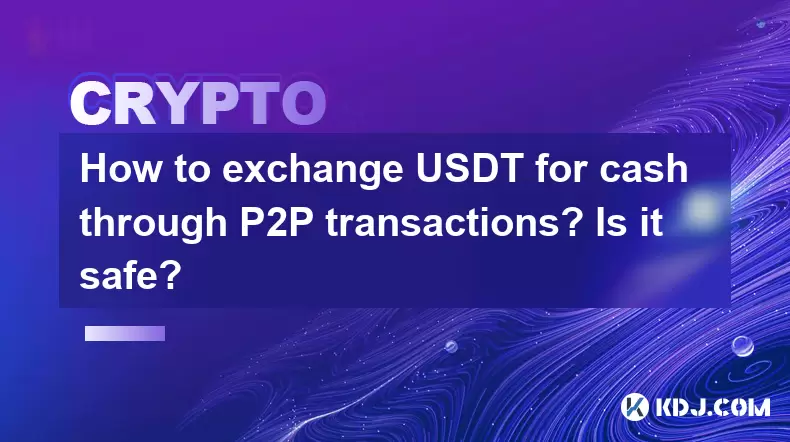
How to exchange USDT for cash through P2P transactions? Is it safe?
Jun 18,2025 at 07:56am
Understanding USDT and P2P TransactionsTether (USDT) is a stablecoin pegged to the value of the US dollar, making it a popular choice for users who want to avoid the volatility of other cryptocurrencies while still participating in the crypto ecosystem. Peer-to-peer (P2P) transactions allow individuals to trade directly with each other without going thr...
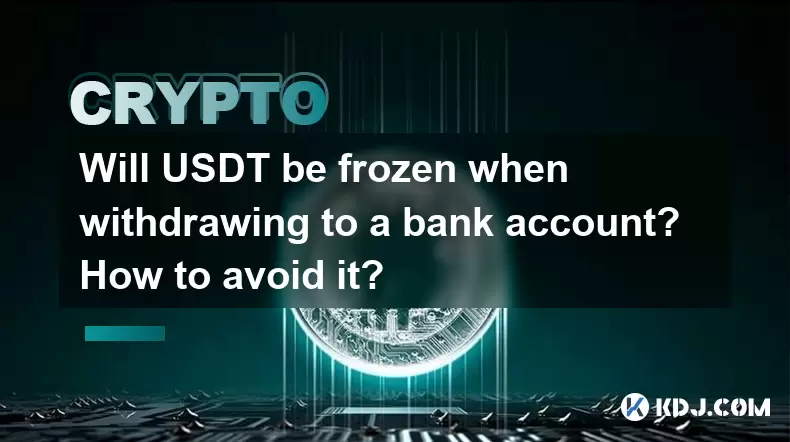
Will USDT be frozen when withdrawing to a bank account? How to avoid it?
Jun 15,2025 at 10:03am
Understanding USDT Withdrawals and Bank Account Freezing RisksWhen users decide to withdraw USDT (Tether) to a bank account, one of the most common concerns is whether their funds will be frozen during the process. This concern stems from real-life cases where individuals have encountered delays or restrictions when converting digital assets into fiat c...

How to avoid risks when exchanging USDT for cash? What are the pitfalls?
Jun 11,2025 at 08:14pm
Understanding the Risks of Exchanging USDT for CashWhen exchanging USDT (Tether) for cash, users must be aware of the potential risks involved. As a stablecoin pegged to the US dollar, USDT is widely used in crypto transactions due to its price stability. However, converting it into fiat currency like USD or CNY can expose users to several pitfalls, inc...

How to choose a reliable USDT exchange service provider? How to identify?
Jun 12,2025 at 03:15pm
Understanding the Role of USDT in Cryptocurrency TradingUSDT (Tether) is one of the most widely used stablecoins in the cryptocurrency market. It is designed to maintain a 1:1 peg with the U.S. dollar, offering traders and investors a way to hedge against volatility while remaining within the crypto ecosystem. Choosing a reliable USDT exchange service p...

What is the most convenient way to cash out small amounts of USDT? Is there a shortcut?
Jun 11,2025 at 11:00pm
Understanding the Need to Cash Out Small USDT AmountsCashing out small amounts of USDT can be a challenge for many crypto users. Traditional methods often involve high fees, minimum withdrawal limits, or cumbersome verification processes that make it inefficient for small transactions. The key is to find a method that balances speed, cost, and convenien...

How to transfer USDT to PayPal or international payment tools?
Jun 15,2025 at 05:28am
Understanding the Basics of USDT and PayPal IntegrationUSDT (Tether) is a stablecoin pegged to the US dollar, offering blockchain-based value transfer with minimal volatility. PayPal, on the other hand, is a centralized digital wallet that facilitates fiat currency transactions globally. Direct integration between USDT and PayPal does not exist due to t...

How to exchange USDT for cash through P2P transactions? Is it safe?
Jun 18,2025 at 07:56am
Understanding USDT and P2P TransactionsTether (USDT) is a stablecoin pegged to the value of the US dollar, making it a popular choice for users who want to avoid the volatility of other cryptocurrencies while still participating in the crypto ecosystem. Peer-to-peer (P2P) transactions allow individuals to trade directly with each other without going thr...

Will USDT be frozen when withdrawing to a bank account? How to avoid it?
Jun 15,2025 at 10:03am
Understanding USDT Withdrawals and Bank Account Freezing RisksWhen users decide to withdraw USDT (Tether) to a bank account, one of the most common concerns is whether their funds will be frozen during the process. This concern stems from real-life cases where individuals have encountered delays or restrictions when converting digital assets into fiat c...

How to avoid risks when exchanging USDT for cash? What are the pitfalls?
Jun 11,2025 at 08:14pm
Understanding the Risks of Exchanging USDT for CashWhen exchanging USDT (Tether) for cash, users must be aware of the potential risks involved. As a stablecoin pegged to the US dollar, USDT is widely used in crypto transactions due to its price stability. However, converting it into fiat currency like USD or CNY can expose users to several pitfalls, inc...
See all articles

























































































